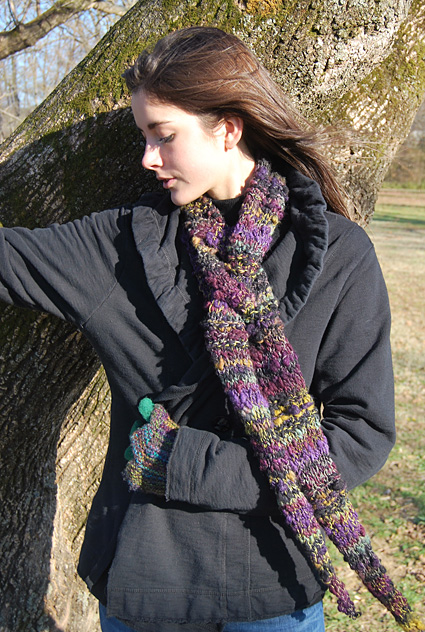
 |
|
|
 |
Got yardage? If you are into art yarns, this is always the first question you ask. Unless the spinner (you or your favorite yarnie) has a bulky flier, chunky skeins top out around 35 yds. It’s no mystery that bigger your needles, the less yardage you need to knit the same width and length of scarf. But just how far will your yarn go? This simple but elegant scarf is designed to make the most of available yardage and artful “moments” in your yarn (see Lynne's article for tips on knitting with momentous yarns). I wrote the pattern in sections so you can mix and match them to meet your yarn and yardage needs. I’ve also included instructions for three different gauges/WPI with yardage counts to match. Approximate yardage is provided for each pattern section so you have a better handle on how far you can get with what you’ve got. The Thruway section is a handy double keyhole which stylishly yet practically channels the scarf around your neck and holds it in place, so you feel cuddled and comfy in your creation. |
The beauty of this pattern is that it works so well with all those wonderful handspun “art” yarns you can buy from independent spinners. Browse through Etsy to see what’s available. Look for something that appeals to you – you don’t need much in the way of yardage, and it’s a great way to use up interesting thick-and-thin yarns. Key words to search for: handspun, plus any of these terms: art yarn, thick and thin, boucle, and corespun. |
|
|
|
|
|
SIZE
|
|
FINISHED MEASUREMENTS |
|
MATERIALS Note: For all versions, the Commercial Yarn Alternative can be purchased from handspinners online. See last paragraph in introduction above. Fiber Preparation + Drafting Method is described in detail in Lynne's article in this issue of Knittyspin. MATERIALS Finished Yarn: WPI 6 [shown in 4th photo]: Finished Yarn: WPI 5 [shown in 3rd photo]: Finished Yarn: |
|
GAUGE |
WPI 7: 12
sts/16 rows = 4 inches in stockinette stitch
using US #13/9mm needles. |
|
PATTERN NOTES To lengthen or shorten the scarf, remove a Block section or two, or eliminate 2-4 stockinette rows in each Block. |
|
Mix and match these sections to please
yourself and your available yardage.
The samples as photographed are worked as follows: Sections: Onramp: CO 2 sts. City Block: Knit 6 rows. Speed Bumps: Knit 6 rows. Thruway [see above]:Yardage required: 10[8, 6] yards. In this section, the row is divided into three panels and worked separately. Panel 2 has an extra row on purpose because it gets twisted before joining. Row 1 [RS] K5[4,3], turn. Rejoin yarn to start of last 5[4,3] sts of row. Row 1 [RS] K last 5[4,3] sts of row. Final row [WS]: Knit across all 15[12, 9] sts to rejoin row. Offramp: Row 3 [RS]: K2tog, k to end. M1: make one by casting on with backward loop
cast on. |
|
DIRECTIONSStart with an Onramp and work City Blocks,
Speed Bumps and Thruways as you wish, until
you’ve just about
run out of yarn.
End with an Offramp.
FINISHING Feeling frou frou? Cut a few lengths of especially momentous yarn and thread them through the cast on row and tie with overhand knot. Or not. |
| ABOUT THE DESIGNER |
|
Eat, sleep, spin, knit, (dye, crochet,
weave, felt) usually with dog attached
and hubby looking on.
|
|
Pattern & images © 2011 Lynne Vogel. Contact Lynne |